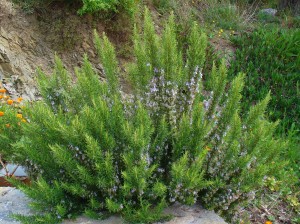Rosemary can be used both as a fresh green, a dried herb, an extract, and as a tea. If you intend to use rosemary for medicinal purposes, I’d recommend doing further personal research first. FYI, in researching for this article I read a blog written by a man who was having problems remembering where he put his keys/glasses, etc. He realized that after a few weeks of eating rosemary his memory was vastly improved!
Food for thought! (literally!)
Rosemary – the Herb:
- is high in iron, calcium, and vitamin B6
- contains two important ingredients – caffeic acid and rosemarinic acid – both of which are potent antioxidant and anti-inflammatory agents that may shield the brain from free radicals, lowering the risk of strokes and diseases like Alzheimer’s, ALS
- reduces inflammation (inflammation is associated with contributing to asthma, liver disease and heart disease)
- is a rich source of vitamin E (alpha tocopherol) a potent antioxidant, which contributes to its free radical fighting powers further still
- helps prevent breast cancer by blocking estrogen
- prevents age-related skin damage
- boosts the functioning of the liver and acts as a mild diuretic to help reduce swelling
- helps to regulate the menstrual cycle and to ease cramps
- helps to lower blood sugar and raise blood pressure
- treats migraines
- stimulates the appetite
- soothes aching muscles and joints and eases arthritis pain when oil or freshly cut sprigs are added to bath water
Rosemary Extract:
- has been shown to improve the shelf life and heat stability of Omega 3-rich oils and we all know the importance of Omega 3 in our diet!
- treat bites and stings externally
- stimulates an increased blood supply when used externally during a massage (oil distilled from rosemary leaves can be mixed with vegetable oil)
- is used in aromatherapy as an inhalant/decongestant and to enhance memory
- has been shown to possess an ability to inactivate toxins and then eliminate them from your liver, before they can inflict any serious damage
- stimulates your liver to work more efficiently, which helps you feel more healthy and energetic
If you are interested in consuming rosemary as a supplement, the recommended dosage is two 400mg rosemary capsules up to three times a day. Warning: Pregnant women should not take rosemary extract (unless under the care and guidance of a natural health care practitioner or herbalist). In addition, you should not take rosemary supplements if you suffer from high blood pressure or epilepsy.
Rosemary Tea:
- is a warming and stimulating drink which has pain relieving properties; it has been used for centuries to ease the symptoms of headaches and rheumatism and improves circulation.
- aids in focus and concentration
- stimulates the digestive system
- when cooled can be used as a mouthwash to combat oral bacteria
- can be used to rinse hair to ease scalp problems such as dandruff and to also ease the pain associated with Scabies. (My kids came back from a visit with their father with a case of Scabies. I was horrified. I wish I knew then about using rosemary tea to bathe their little bodies.)
To make rosemary tea, steep two teaspoons of the dried flowering tops in one cup of water for twenty minutes.
Health Precautions and Toxicology
- Rosemary in culinary or therapeutic doses is generally safe BUT, if you have epilepsy, don’t take medicinal amounts of rosemary; the camphor in the herb could potentially aggravate seizures.
- Rosemary essential oil is potentially toxic if ingested (training is required for the safe ingestion of oils)
- Large quantities of rosemary leaves can cause adverse reactions, such as coma, spasm, vomiting, and pulmonary edema (fluid in the lungs) that can be fatal
- Avoid consuming large quantities of rosemary especially if pregnant or breastfeeding
Rosemary Potpourri
- After the leaves are stripped, toss the stems into the fireplace to fill the house with a delightful, pine-scented perfume
- Both the leaves and the flowers of rosemary are edible
- Add some leaves or flowers to potpourri
- Rosemary makes a natural moth repellent
- The plant prefers warm climates and well-drained soil
- A rosemary plant can spread a good two or three feet producing plenty of herbal sprigs
- Putting a few sprigs in your next bath will create a lovely, aromatic soak
- Try garnishing a platter with rosemary instead of parsley
- Use rosemary as background greenery in a flower bouquet
- Weave branches into wreaths or garlands as a silvery, fragrant base
To support your cleanse visit our products page:
www.detoxforlife.biz/products-page/
For additional information, visit our website at www.detoxforlife.biz.
To schedule your next treatment contact us directly at (480) 949-6570

